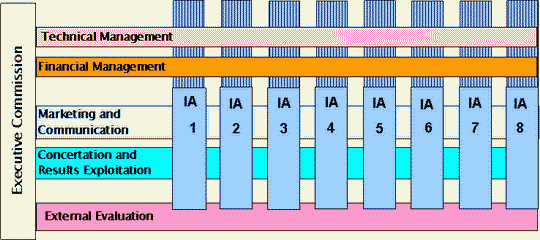The
operational model used is based on well-tried methods and formats
and is organised into a matrix:

- Operational management of those projects in the ‘Digital
Community’ Area is under the direct responsibility of the
Programme’s Executive Committee, given that these projects
correspond to the structural investments that the rest of the
Programme is aligned to and leveraged by.
- Operational Management of projects in the other Intervention
Areas is under the responsibility of the relevant intervenients
who, by means of the public bid process, contract with the
Executive Committee of the Aveiro Digital Programme to ensure
execution of the given projects.
The
public bid process is designed to ensure that these intervenients
meet stringent capability and financial status criteria, that they
are suitably qualified to manage and lead the projects from the
point of view of the clients of the relevant services and solutions,
and that they can take on the various responsibilities relating to
building and sustaining their projects.
Given the
focused and concrete nature of both the projects and their
objectives, it is to be hoped that the process of accepting and
selecting candidatures will prove to be uncomplicated. In order to
guarantee full transparency and impartiality, however, the
evaluation and selection procedure will be published beforehand.
The
evaluation and external audit system is based on annual operations
reports, and justifications of the results therein, for all
projects, including those in the Digital Community Intervention
Area. It will impact directly on the acceptability of the financial
and resource usage reports, and may give rise to corrective or
alternative recommendations for the technical plans, their related
budgets and any resulting contractual changes.
More
specifically, the evaluation and external audit system includes the
setting up and operation of a Permanent Evaluation Committee made up
of experts in the areas of IT and development and of representatives
of POSI, as the funding body.